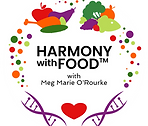Prebiotic and Probiotic Foods
- Meg O'Rourke
- Apr 4, 2023
- 2 min read
This week on the Harmony with Food Radio Show, I continued our discussion on mineral deficiencies and talked about the importance of pre- and probiotics, as well as where to find them in your food.
Mineral Deficiencies
In last week's show, I talked about different vitamins and minerals and the roles they play in the body. Today I continued that discussion, but if you want more information, head back to last week's episode!
Cysteine
Cysteine has antioxidant properties and is a precursor molecule to glutathione, which is the master antioxidant. You can get cysteine through poultry, eggs, red peppers, garlic, onions, broccoli, brussels sprouts, oats, granola, wheat germ, and lentils.
If your cysteine is depleted, you may also need to use a supplement called NAC, or n-acetyl cysteine, if you aren't able to get those levels up through food alone.
Testing for Mineral Deficiencies
The micronutrient testing I do looks at 36 essential vitamins and minerals. When you go to your doctor's office they may test iron, Vitamin D, and Vitamin B12, but that's usually it. Vitamins and minerals play a vital role in the body, and with testing, I can guide you toward the right foods to eat and supplements to take if needed.
Micronutrient testing works even better when we can pair it with microbiome testing because it allows me to see if your gut health is influencing your ability to absorb nutrients. For example, if you are low in multiple fat-soluble vitamins, I can look at your microbiome test and see if you are having trouble absorbing fats, and then we can treat that problem from the source so you can start absorbing nutrients from your food again.
If you're interested in testing, click below to schedule a free call with me!
Prebiotic and Probiotic Foods
Probiotics
Probiotics are friendly bacteria that support a healthy gut microbiome and maintain the integrity of the gut lining and can be found in many foods. They can also help boost the immune system, promote healthy inflammatory responses, improve digestion, help heal inflammatory bowel conditions, manage and prevent skin conditions, fight foodborne illnesses, and improve psychological functions.
You can find probiotics in the following foods:
Sauerkraut
Kimchi
Kombucha
Keifer
Yogurt
Lassi
Miso
Pickles
Tempeh
There are a number of different probiotics and we can do microbiome testing to find out which specific ones you may be low in so I can point you toward the correct foods and supplements to take.

Prebiotics
Prebiotics are carbohydrate-based sources of fiber that are food for beneficial bacteria in your gut. They help your gut bacteria grow and thrive. They're helpful in the treatment of irritable bowel syndrome, inflammatory bowel disease, and leaky gut, and help regulate bowel function.
A few food sources of prebiotics include:
Artichokes
Tomatoes
Onions
Leafy greens
Asparagus
Garlic
Leeks
Berries
Bananas
Kiwi
Cherries
Apples
Pears
Mangoes
Quinoa
Flaxseed
Oatmeal
Lentils
Chickpeas
White Beans
Black Beans
If you're suffering from digestive problems, all of these foods can be extremely beneficial. If you aren't sure where to start, click HERE to schedule a free 45-minute call with me.




.png)


























Comments